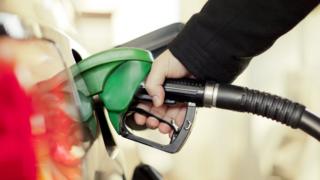
[ad_1]

Image copyright
Getty Images
The UK’s inflation rate fell in April to its lowest since August 2016 as the economic fallout of the first month of the lockdown hit prices.
The Consumer Prices Index (CPI) fell to 0.8% from 1.5% in March, the Office for National Statistics (ONS) said.
Falling petrol and diesel prices, plus lower energy bills, were the main drivers pushing inflation lower.
But prices of games and toys rose, which the ONS said may have come as people occupied their time at home.
Jonathan Athow, deputy national statistician for economic statistics at the ONS, said: “While the coronavirus limited the availability of some goods and services, its effect on prices was more muted.”
He said that food prices generally rose no more quickly than other goods and services, “though fresh vegetables did see stronger rises”.
The ONS said average petrol prices dropped by 10.4p a litre between March and April – the biggest fall since unleaded petrol records began in 1990 – amid a slump in global oil prices.
Energy prices also pushed inflation lower as regulator Ofgem reduced its default tariff cap.
Most economists had expected inflation to fall to 0.9% last month, and have predicted the rate will fall further as the economic fallout of the pandemic continues. CPI is now far below the Bank of England’s 2% target.
Better news for savers
The ONS said clothes retailers, hit during the early days of the lockdown by weaker footfall and then the closure of outlets, resorted to more discount sales than usual to try to shift their stock.
Goods seeing upward pressure on prices included video games and consoles, board games and children’s toys, the ONS said. And the price of knitting wool rose, another sign of the crafts and hobbies popular with people staying at home.
Laura Suter, personal finance analyst at investment platform AJ Bell, said it was likely that as shops start re-opening retailers would deeply discount prices, putting further downward pressure on inflation.
She also pointed to positive news for savers. “For the first time in ages [savers] can now get above inflation interest rates on easy-access savings accounts – from more than one account.”
Core inflation, which excludes energy, food, alcohol and tobacco, held broadly steady at an annual rate of 1.5%.
Inflation as measured by the Retail Prices Index (RPI) – an older measure of inflation which the ONS says is inaccurate, but is widely used in bond markets and for other commercial contracts – dropped to 1.5% from 2.6%.
[ad_2]
Source link